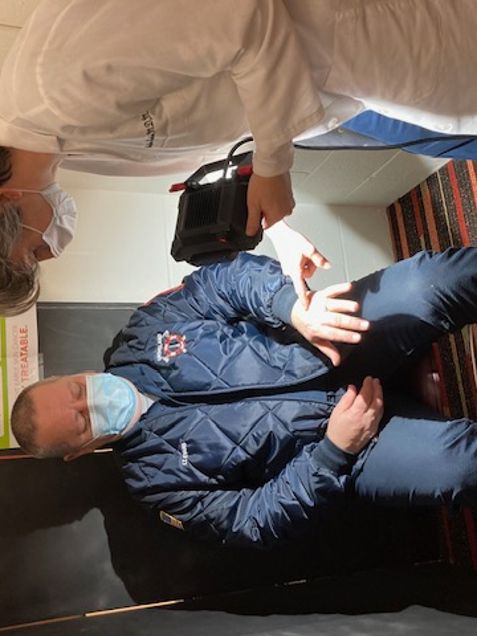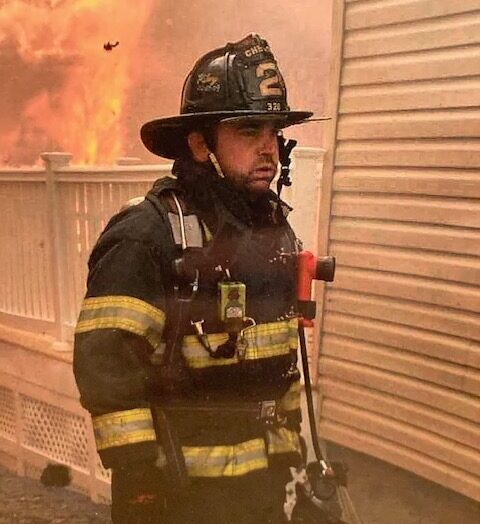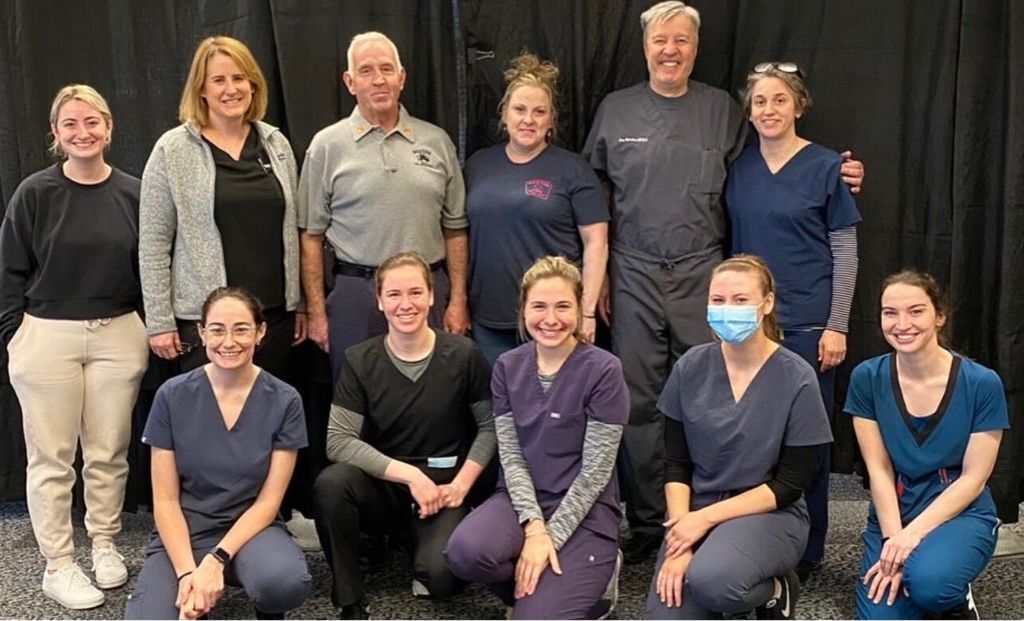Christine Kannler (CAS`96, MED`00, SPH`00) remembers sitting in Professor of Sociology John McKinlay’s class as a College of Liberal Arts — now College of Arts & Sciences (CAS) — first-year student, learning about medicine through the lens of sociology and public health.
She was inspired by the course to work as a research assistant for Professor McKinlay, a medical sociologist and epidemiologist, doing research on cardiovascular health in children, and to pursue a career in medicine, applying as a sophomore to Boston University Medical School — now the Chobanian & Avedisian School of Medicine — through the BU Modular Medical/Dental Integrated Curriculum (MMEDIC) program.

More than 30 years later, Kannler, now a dermatologist, continues to find inspiration from her classes with Professor McKinlay — through her volunteer work as a public health advocate, performing pro-bono skin cancer screenings in firehouses, and educating firefighters on how to detect cancers and reduce cancer exposure. In recognition of this work, Dr. Kannler will receive a 2023 Arts & Sciences Distinguished Alumni Award during BU Alumni Weekend on September 23.
“The process of inquiry that led me to better understand firefighters had an increased cancer risk began in CAS,” said Kannler, who practices at Northeast Dermatology Associates in Andover, Mass., and Manchester, N.H. “Dr. McKinlay was a wonderful educator and researcher and I never forgot his lessons that non-medical factors such as occupation or environment can have profound effects on health. If we want to change health outcomes, we need to educate people like firefighters to change behavior that has both short-and long-term effects on their health. I clearly wouldn’t be where I am today and wouldn’t have the leverage to help the firefighters if I hadn’t attended BU.”

Kannler, who grew up in Wakefield, Mass., initially enrolled in CAS as a marine biology major. She switched to biology as a first-year, after taking Professor McKinney’s class. In medical school, she was drawn to research and clinical care topics where she felt she could define problems and identify solutions. She performed research on skin cancer and tobacco, which led her to internal medicine and then dermatology.
In 2015, Kannler encountered a medical problem that she was unable to solve. Her 36-year-old brother, a firefighter in Chelsea — one of the busiest firehouses in the country at the time — and an instructor at the Massachusetts Firefighting Academy in Stow, went to the hospital for gastrointestinal issues. Two days later, he was diagnosed with stage four esophageal cancer. He passed away about a year later.
“It was shocking to my family because he seemed completely healthy. There were no symptoms,” she said. “It was especially difficult for me as a physician because I was a mere observer of the medical system and not an active participant. I provide encouragement and support to patients every day but when the person who is ill is your brother, the experience is completely different.”
In learning about her brother’s illness, Kannler discovered that many firefighters — and doctors — don’t know about the increased risk of cancer for firefighters. This led her to a new role as an advocate for cancer prevention and awareness in firefighter communities.
“I had known about the elevated cardiac risks seen in firefighters. I had educated my brother about his cardio health. I had encouraged him to eat well and to exercise; but, as I started doing research about esophageal cancer and firefighting, I became alarmed,” she said. “There was a fair amount of data about firefighters and elevated cancer incidence in the occupational health journals and even though I had a good knowledge base of cancer, I didn’t know anything about this. As I learned more, it was clear I needed to start educating both firefighters and medical professionals to screen our firefighters for cancer as soon as possible.”

As a dermatologist, Kannler understood she could reach people through the American Academy of Dermatology’s SPOT Skin Cancer initiative, a public awareness and community outreach program that she had been involved in as a dermatology resident. She took the program on the road, performing skin cancer screenings in firehouses across Massachusetts and taking advantage of her visits to educate firefighters about the signs and symptoms of other types of cancer and how to reduce their exposures.
To spread the word, Kannler contacted the Department of Fire Services and mentioned that her brother had been an instructor and offered free cancer screenings. She also started attending union meetings of the Professional Fire Fighters of Massachusetts.
In addition to her work with the firefighting community, Kannler started educating fellow physicians about the increased risk of cancer by presenting at hospital grand rounds and discussing the need for insurance companies to provide cancer screenings at earlier ages for firefighters.
As a result of her efforts, Peter Ostroskey, the Massachusetts Fire Marshal, supported the program so that any Massachusetts town or municipality could arrange for a free skin cancer screening. Kannler was awarded the Fire Marshal Award and the American Academy of Dermatology featured her volunteer work at the 2022 Presidential Gala. She recently attended the Fire Department Instructors Conference, an annual firefighting conference and exhibition held in Indiana, to spread the word to other communities around the country and to extend her work to other states.

“Here we have a situation where we can make a huge impact on the firefighters that selflessly give of themselves,” she said. “At this point we’re screening firefighters across the state — from Nantucket and Orleans on the cape to Pittsfield and Longmeadow in the west. And I’ve been lucky that I’ve been able to find and work with people passionate about this issue. We’ve been able to start to grow this program to other states; and to pair with other researchers and give them the data that I’ve collected over the past years.”
Since 2018, Kannler has performed over 4,000 free skin cancer screenings in firehouses throughout Massachusetts. But Kannler says there is more work to be done. She hopes that Boston University’s recognition of her work will help inspire additional education and save more lives.

“This award is an honor but, of course, it’s bittersweet because it comes from the passing of my brother,” she said. “I couldn’t help my brother but now I can look out for the amazing firefighters that follow in his footsteps.”
Learn more about Kannler’s volunteer work
Watch Christine Kannler’s story on the American Academy of Dermatology Association website